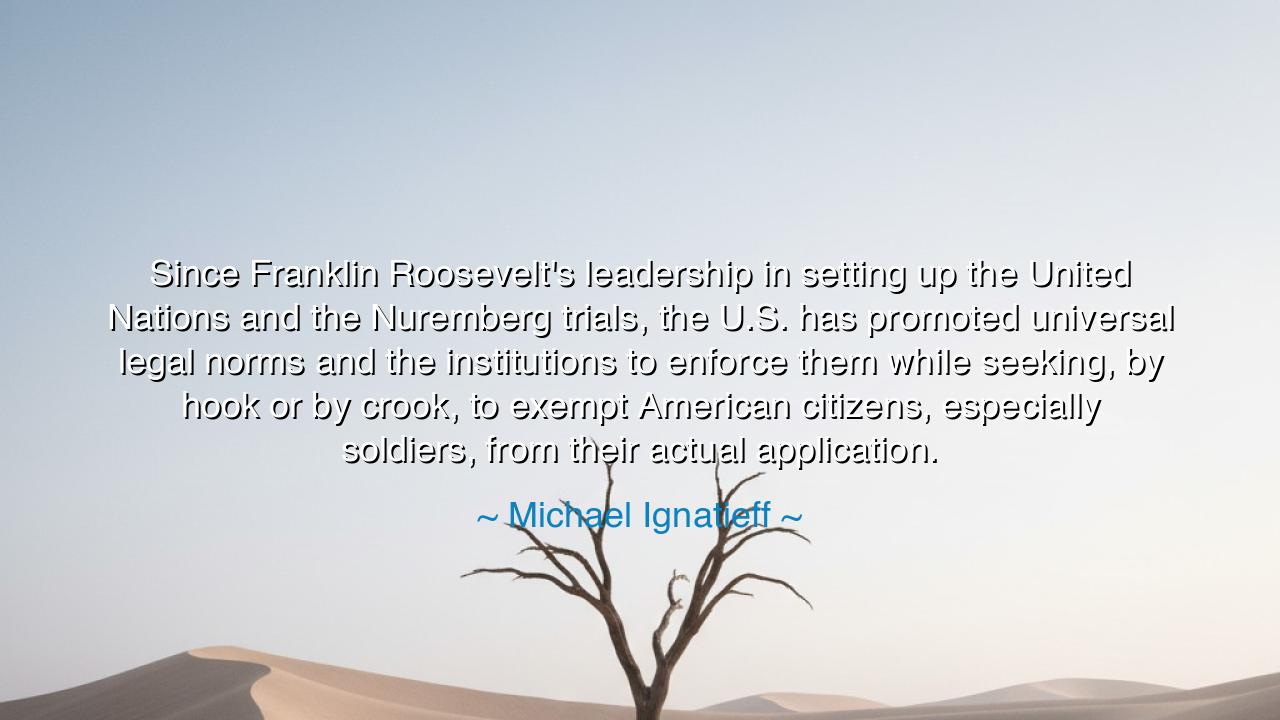
Since Franklin Roosevelt's leadership in setting up the United
Since Franklin Roosevelt's leadership in setting up the United Nations and the Nuremberg trials, the U.S. has promoted universal legal norms and the institutions to enforce them while seeking, by hook or by crook, to exempt American citizens, especially soldiers, from their actual application.






When Michael Ignatieff declared, “Since Franklin Roosevelt's leadership in setting up the United Nations and the Nuremberg trials, the U.S. has promoted universal legal norms and the institutions to enforce them while seeking, by hook or by crook, to exempt American citizens, especially soldiers, from their actual application,” he spoke as one who gazes upon the paradox of empire. His words are both praise and rebuke — for they recognize the noble face of American idealism, yet expose the shadow it casts. Here lies a timeless tension: the desire to lead the world toward justice, while refusing to be judged by the very laws one proclaims sacred. In this contradiction, the modern world glimpses the frailty of power and the enduring test of moral integrity.
The United Nations and the Nuremberg trials stand as towering monuments to humanity’s attempt to impose order upon chaos. In the aftermath of the Second World War, when cities lay in ruins and millions slept beneath the earth, Franklin D. Roosevelt and his allies sought to build a new covenant among nations — a covenant of law over violence, of accountability over arrogance. The Nuremberg tribunal, in particular, was a thunderous declaration that no leader, however mighty, could escape the scales of justice. It was an echo of ancient law, a voice saying: “The sword shall not shield the guilty.” Yet, even as these institutions were born, the seeds of hypocrisy were sown. For those who forged the laws often believed themselves beyond their reach.
Ignatieff reminds us that this is not a uniquely American flaw, but a universal human temptation — the temptation to believe that righteousness is one’s inheritance, not one’s duty. The United States, in championing universal legal norms, became both guardian and violator. It spoke of human rights in the councils of the world, yet shielded its own from the courts that judged others. It sent forth soldiers in the name of liberty, but would not let them be tried by foreign hands. Thus, the nation that helped write the commandments of modern justice often sought to live outside their commandments. This, Ignatieff warns, is the fate of all powers that forget humility.
Consider the lessons of Nuremberg, where once the victors declared that “crimes against humanity” would never again be tolerated. Yet decades later, when wars were waged in Vietnam, Iraq, and beyond, the echo of that promise grew faint. No tribunal judged the bombing of villages; no trial was held for the tortures that darkened prison cells. The very institutions of accountability that Roosevelt envisioned became hollow when truth was bent to serve the flag. History, the sternest of judges, records such contradictions not with hatred, but with sorrow — for they reveal the tragedy of nations that lose sight of the ideals that made them great.
But Ignatieff’s message is not despair — it is awakening. He calls upon us to see that moral leadership cannot rest upon the double standard of the strong and the weak. True greatness is not measured by the power to evade justice, but by the courage to submit to it. The mightiest nation must be the first to bow before the law if the law is to mean anything at all. For when the powerful exempt themselves, the weak lose faith, and the pillars of order begin to crumble. To build peace, one must not only write laws — one must live them.
There is wisdom in this warning for every generation. The temptation to believe that our cause is just enough to excuse our actions lurks in every nation, every movement, every heart. We justify our wrongs because we think ourselves good. But justice, like the sun, shines without favoritism. It burns equally upon friend and foe. To honor the spirit of Roosevelt’s dream and the blood shed at Nuremberg, one must guard against the arrogance of moral privilege. Universal law must remain universal, or it becomes merely a mask for dominance.
Let this truth be passed down: power without accountability breeds decay, and law without equality is but another form of tyranny. If you would lead, lead by example; if you would govern, govern yourself first. Ignatieff’s words remind us that the measure of a nation is not in the strength of its armies nor the eloquence of its ideals, but in its willingness to be bound by the justice it demands of others. Only then can humanity walk the narrow path between power and principle — the path toward a peace worthy of the name.






AAdministratorAdministrator
Welcome, honored guests. Please leave a comment, we will respond soon